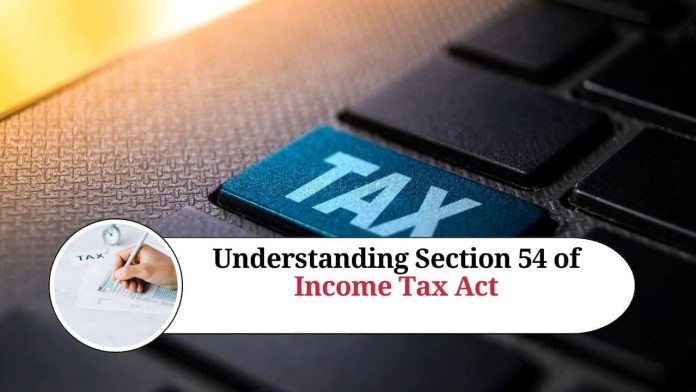Introduction
Section 54 of the Income Tax Act provides taxpayers with significant relief in terms of long-term capital gains. The section allows individuals to save taxes on the gains from the sale of a long-term capital asset by investing the proceeds in another property. In this blog post, we will discuss the provisions of Section 54 and how it can be beneficial for taxpayers.
Provisions of Section 54
Section 54 provides relief to taxpayers who have sold a long-term capital asset such as a house, land, or building. The section states that if the proceeds from the sale are invested in another property within a specified period, the taxpayer can save tax on the gains made from the sale.
Eligibility Criteria
To claim the benefit of Section 54, the following criteria must be met:
- The asset sold must be a long-term capital asset.
- The taxpayer must purchase another property within two years of the sale of the asset or construct a new property within three years of the sale.
- The new property must not be sold within three years of its purchase or construction.
- The cost of the new property must be equal to or greater than the sale price of the old property.
Benefits of Section 54
Section 54 provides significant relief to taxpayers by allowing them to save taxes on the gains made from the sale of a long-term capital asset. By investing the proceeds in another property, taxpayers can defer the tax liability and reduce their overall tax burden. The section is particularly beneficial for taxpayers who have sold a house or land and are looking to purchase another property for personal use or investment purposes.
Calculation of Tax Benefit under Section 54
The tax benefit under Section 54 is calculated as the difference between the sale price of the old asset and the cost of the new property. The tax benefit is equal to the amount of long-term capital gains made on the sale of the old asset. For example, if the sale price of the old property is Rs. 50 lakh and the cost of the new property is Rs. 60 lakh, the taxpayer can claim a tax benefit of Rs. 50 lakh.
Exemptions under Section 54
Section 54 provides exemptions for the following scenarios:
- If the taxpayer purchases a new property before the sale of the old property.
- If the taxpayer is unable to purchase a new property before the sale of the old property, they can deposit the proceeds in a capital gains account scheme before the due date of filing their income tax return. The amount deposited in the scheme can be used to purchase a new property within two years.
- If the taxpayer is unable to construct a new property within three years, they can deposit the proceeds in a capital gains account scheme before the due date of filing their income tax return. The amount deposited in the scheme can be used to construct a new property within three years.
Section 54F
Section 54F of the Income Tax Act provides a similar tax benefit for taxpayers who have sold any asset other than a house, land, or building. The section allows taxpayers to save taxes on the gains made from the sale by investing the proceeds in a residential property within the specified period.
Conclusion
In conclusion, Section 54 is a beneficial provision for taxpayers who have sold a long-term capital asset. It provides significant relief in terms of tax savings on the gains made from the sale of the old property. However, it is important to ensure that the eligibility criteria are met to claim the benefit of the section. Taxpayers should also be aware of the exemptions and benefits provided under Section 54F to make the most of their tax savings.
Read Other Useful Blogs:
FAQs on Section 54 of the Income Tax Act
1. What is a long-term capital asset?
A long-term capital asset is any asset that has been held by the taxpayer for more than 24 months. This includes assets such as land, buildings, and securities such as shares and mutual funds.
2. Can I claim the tax benefit under Section 54 for the sale of a short-term capital asset?
No, the tax benefit under Section 54 can only be claimed for the sale of a long-term capital asset.
3. Can the tax benefit under Section 54 be claimed for the sale of a property that was inherited?
Yes, the tax benefit under Section 54 can be claimed for the sale of an inherited property as long as the property was held for more than 24 months before it was sold.
4. Can the tax benefit under Section 54 be claimed for the sale of a property that was gifted?
No, the tax benefit under Section 54 cannot be claimed for the sale of a gifted property as the property was not purchased by the taxpayer.
5. Can the tax benefit under Section 54 be claimed if the new property is purchased jointly?
Yes, the tax benefit under Section 54 can be claimed if the new property is purchased jointly, as long as the taxpayer has invested their share of the proceeds in the new property.
6. What happens if the new property is sold within three years?
If the new property is sold within three years of its purchase, the tax benefit claimed under Section 54 will be reversed, and the taxpayer will be liable to pay tax on the gains made from the sale of the old property.
7. Can the tax benefit under Section 54 be claimed if the old property was agricultural land?
No, the tax benefit under Section 54 cannot be claimed for the sale of agricultural land. However, taxpayers can claim the tax benefit under Section 54B for the sale of agricultural land.




















